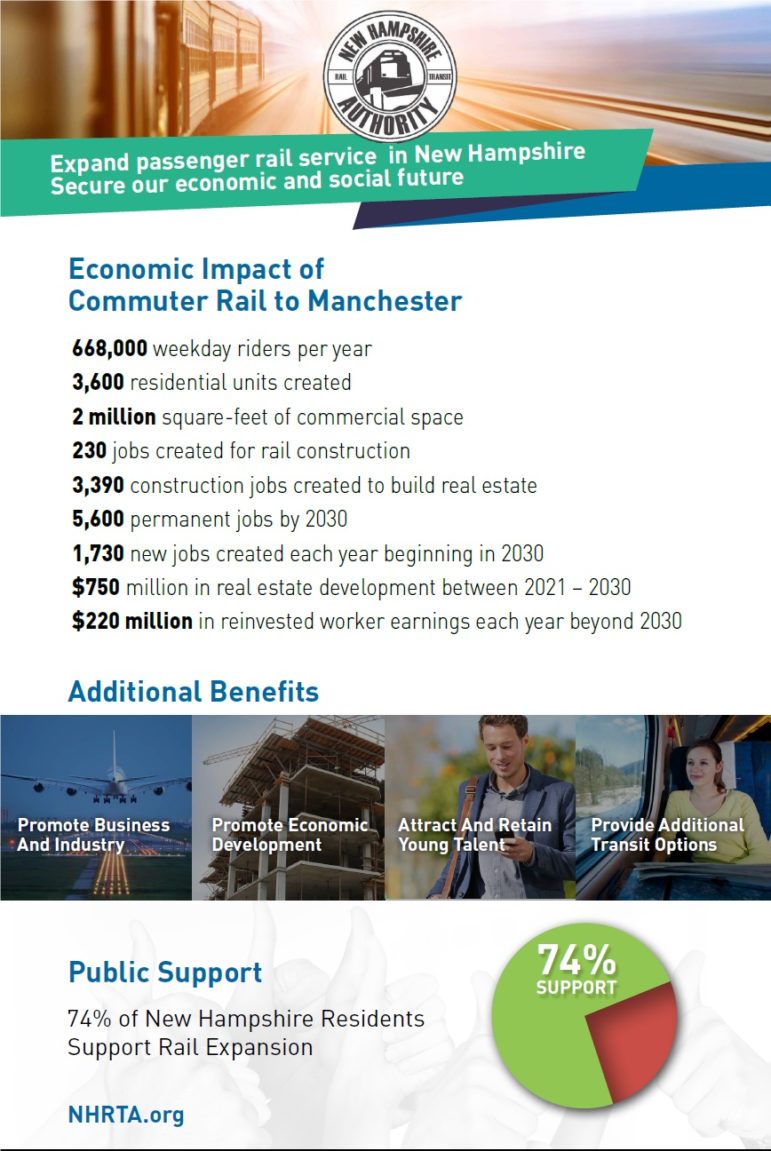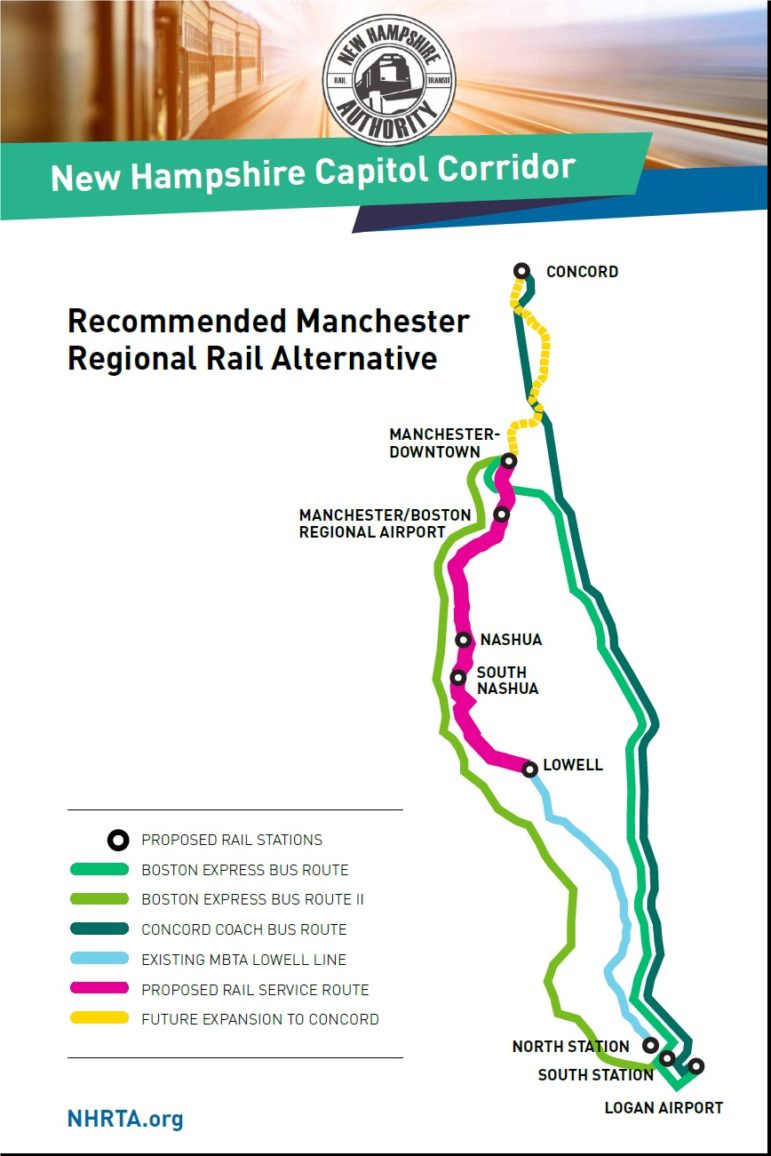
CONCORD, NH – The New Hampshire Rail Transit Authority (NHRTA) along with business and economic development officials from across the state, came together Feb. 29 with a $4 million proposal to move commuter rail forward in New Hampshire, in advance of a March 1 meeting of The House Public Works & Highways Committee on the issue.

The group on Monday called for the House Public Works and Highways Committee to include a key piece of funding for the NH Capitol Corridor rail expansion project in the state’s 10-Year Transportation Improvement Plan, which would allow the state to move forward with the $4 million project development phase of the project, which would include:
- establishing a detailed financial plan
- preliminary engineering
- environmental permitting
- preparation of funding applications for submission to the Federal Transit Administration and Federal Rail Administration.
Among those present in Concord for Monday’s gathering were: Nashua Mayor Jim Donchess; Michael Skelton, CEO of the Greater Manchester Chamber of Commerce; Graham Chynoweth, Chief Operating Officer and Executive Vice President of SilverTech; and Carmen Lorentz, Director of the NH Division of Economic Development.

“The House Public Works and Highways Committee has a unique opportunity to leverage federal dollars at no cost to New Hampshire taxpayers and take the next step in the process of expanding passenger rail from Boston to Manchester,” said Michael Izbicki, Chairman of the NH Rail Transit Authority.
“The public and the business community overwhelmingly support this project. This is our only chance to obtain significant federal dollars for project development which will help us move forward with passenger rail expansion along the Capitol Corridor, something that we know would have a transformative impact on New Hampshire’s statewide economy.”
New Hampshire would only be required to contribute 20 percent toward the cost of the project development phase, and could rely on its share of accrued “toll credits” to serve as the match for federal funds, which would require zero out-of-pocket cost to New Hampshire, according to the group.
A Public Policy Polling poll released last fall indicates 74 percent of New Hampshire residents support extending commuter rail from Boston to Manchester, an increase from 2014 in which 68 percent said they supported commuter rail.
“At this stage we are not asking the legislature to commit to the construction of the project, rather we are asking that they support the use of federal funds to advance the project development phase,” said Victoria Sheehan, Commissioner of the NH Department of Transportation. “The $4 million investment would include the completion of the design and permitting, but also the development of a financial plan for both the capital construction as well as the operating costs. Completing this phase will provide answers to many of the questions posed in recent weeks, allowing lawmakers to make an informed decision on how best to proceed in the future.”
Released in early 2015, the NH Capitol Corridor Study detailed the many benefits of rail expansion. With four NH commuter rail stops along the NH Capitol Corridor, passenger rail service would draw a minimum of 668,000 riders each year, leading to the creation of 5,600 permanent jobs supporting 3,600 new residential units along the corridor. Construction of the rail line would generate about 230 jobs, and an additional 3,400 construction jobs would be created to build the real estate development generated by rail. Beginning in 2030, 1,700 new jobs would be created every year due to the expansion of passenger rail.
“The single biggest thing state government can do to improve the business climate for businesses like Dyn or SilverTech is making commuter rail to Boston happen,” said Graham Chynoweth, Chief Operating Officer and Executive Vice President of SilverTech. “We need access to an expanded talent pool to compete and grow. My message is short and simple: state government should act now.”
During the past year, the NH Rail Transit Authority has made substantial progress toward its goal of expanding passenger rail along the New Hampshire Capitol Corridor with lawmakers passing two key pieces of legislation. Senate Bill 63 streamlined NHRTA by decreasing the members of the board of directors and by creating an advisory board, which not only helps NHRTA operate more efficiently, but also improves its standing in the eyes of federal agencies looking to invest in rail expansion projects. In addition, Senate Bill 88 created a legislative commission that is studying public-private partnerships, which could ultimately create new funding sources for all infrastructure projects, including rail.
According to the NH Capitol Corridor Study results, the potential economic impacts from the Manchester Regional Rail Alternative include:
- 5,600 permanent jobs supporting 3,600 new residential units
- 1.9 million square feet in real estate development
- 3,390 construction jobs would be created to build the real estate development generated by rail
- 1,730 jobs would be created every year beginning in 2030
- $750 million in real estate development would be added to the state’s output between 2021 and 2030, with reinvested earnings adding another $220 million per year beginning in 2030.
The Manchester Regional Rail Alternative carries a total investment of $245.6 million, but through a combination of 50 percent federal support and contributions from regional partners, New Hampshire’s investment is estimated to be $72 million. According to the Capital Corridor Study, the service is expected to require an annual investment of $11 million to account for debt service, operating and maintenance costs. Fare box revenues could reduce that figure by 50 percent and public-private partnerships could decrease costs even further.
Along with a station at the Manchester-Boston Regional Airport, the Manchester Regional Rail Alternative would establish a station in downtown Manchester on Granite Street, along with two stations in Nashua: a station at Crown Street and a station at either the Pheasant Lane Mall or on Spit Brook Road.
The House Public Works & Highways Committee is scheduled to meet on March 1 to take up this issue. A list of members is available here.
To learn more about efforts to expand passenger rail in New Hampshire, please visit www.nhrta.org.







